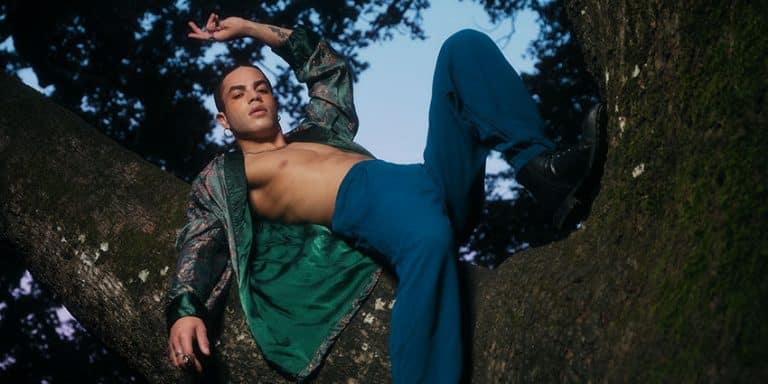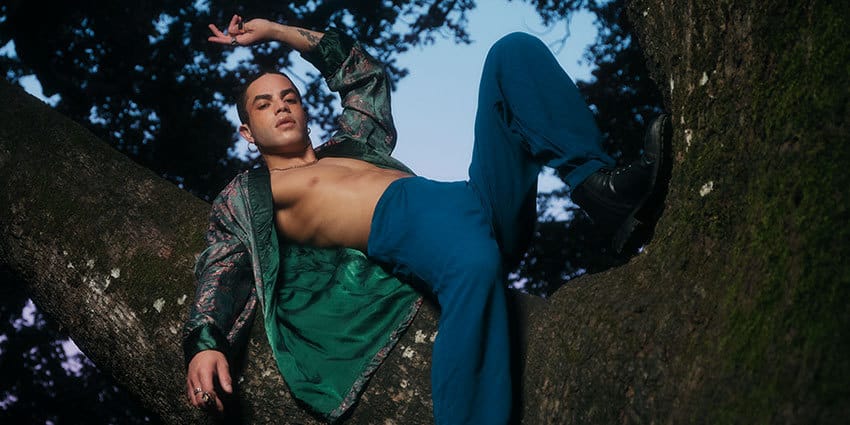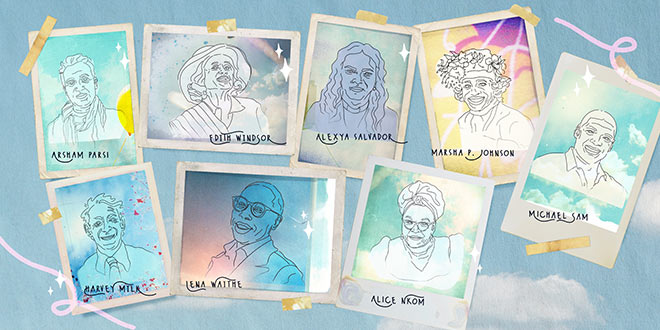There’s a thing every bi+ person knows: nobody else believes in us. And out of everyone who falls under the pan/bi+ umbrella, nobody struggles with that invisibility more than bi+ men.
Just look at some of our pop culture icons; you ask the average person on the street, and they’ll say David Bowie was straight and Freddie Mercury was gay. Both these gems of our time were bi+. Likewise, when we talk about Malcolm X, Marlon Brando, or Carey Grant, their intimate relationships with other men are chronically erased. While these men are just a handful in our constellation of bi+ icons, nobody can debate that these men haven’t shaped our contemporary landscape.
And their sexualities were part of that. While folks may try to write over bisexuality, bi+ men have been around since time began – and lucky for us, they’re here to stay.
The problem? Although every bi+/pan person faces rejection from both the hetero and the queer community, nobody is at the receiving end quite like bi+ men.
The stigma of bi+ men
To folks on the outside, bisexuality and untrustworthiness go hand in hand. Straight and gay folks alike write bi+ folks off as fakers – and if they do admit we exist, we’re often nothing more than born cheaters. While bi+ folks of all genders battle these negative stereotypes, bi+ men bear the brunt of it. According to one study, bi+ men are considered less physically attractive than their straight or gay peers.
To make things worse, men who come out as bi+ are often just assumed to be a closeted gay man – to the point that many straight women doubt their bi+ partner’s attraction to them. Major newspapers like The New York Times calling bi+ folks “liars” in their headlines doesn’t help, either.
While men often have more privilege and security than women, bi+ men face unique hurdles. According to bi+ men themselves, they walk a tightrope of masculinity, having to not only be enough to partners of all genders but “masculine” enough for their workplace.
Biphobia does more than make men uncomfortable; it makes them unsafe and subject to absolute rage. When Cornell’s study emerged showing that virtually nobody is completely heterosexual, the internet lost its collective shit. Autostraddle compiled some of the wildest comments people wrote in response to The Daily Mail’s article on the study – and it is shocking to see how vehement people were about denying any dash of bisexuality running through their veins.
With so much ridicule in our public sphere, is it really any wonder to see why nearly half of bi+ men are still closeted at work? When the hetero-dominated world demands men perform their masculinity according to a rigid set of expectations, it’s easy to understand why bi+ men would do their best to fly under the radar.
It becomes even easier to see why when we look at the men brave enough to publicly announce their bi-ness. In 1983, David Bowie openly said coming out had been a “mistake;” the American public just wasn’t ready to embrace a bisexual performer. According to him, his coming out hindered his creative career and kept opportunities out of his reach. Likewise, Billie Jo Armstrong of Green Day’s openness about his bisexuality has come at a cost. Since marrying a woman, his sexuality has been ridiculed and called into question relentlessly.
We can’t even escape biphobia in today’s media. When Bi boys do show up on TV (which is rare), they’re villains – from the garbage in reality TV shows to Loki. When a bi+ man exists, he’s the bad guy, the deceiver.
When you look at it that way, it’s no wonder that only 19% of bisexual folks are fully out of the closet. Being painted as a villain gets exhausting – especially when it comes from your own community.
LGBTQ folks can be biphobic, too
If you look at Billie Joe Armstrong’s struggles with acceptance, a lot of that ridicule and doubt about his sexuality comes from within the LGBTQ community itself. Bi+ folks have a long history of getting ostracized by their own groups – and it impacts our dating lives.
Case in point: straight women aren’t alone in taking issue with dating queer, bi, and pan men. Even bisexual women like Amber Rose have said they wouldn’t date bi+ men. Likewise, while many gay men celebrate their bi+ peers, many others accuse them of coming out for attention and negate their queer experience.
In my own experience, I hear biphobia against men in particular virtually every time I’m in a large queer event of largely cisgender gay or lesbian folks; a bi+ man, often, is seen as an intrusion into their space.
It’s not just my own observations I’m going off of, though. In 2013, a survey conducted by Pew Research Center found that the LGBTQ community as a whole agreed that bisexual men were the least accepted sexual orientation when compared to bisexual women, gay men, and lesbians. In fact, just a piddly 8% of our community reported “a lot of social acceptance of bisexual men.” For comparison, nearly half said there was “no social acceptance” of bisexual men in our current society.
Yikes.
This possibly has to do with our culture’s obsession with men being the ultimate end-goal for all sexuality. The cultural assumption of straight folks tends to be that folks are more attracted to men, meaning that bi+ women are always assumed straight and bi+ men are secretly gay.
That doesn’t mean it’s easier to date other queer people; if anything, gay men and lesbians often assume that bi+ folks are just straight people who want attention. That could be part of the reason why bi+ people tend to have more straight-assumed relationships.
For bi+ men though, that leaves them at a lonely crossroads: either date someone and stay closeted about their fluid sexuality, or go public with their identity and risk losing potential partners due to their own ignorance.
Let me be clear: these stigmas are doing more than just bumming some bi+ guys out. According to The Advocate, it’s “literally killing us.” One in three of all bi+ men have contemplated or attempted suicide, and roughly half suffer from mood disorders. And compared to their gay counterparts, bi+ men are more likely to live in poverty, be raped, or experience domestic violence. This constant stigmatization causes depression and low self-worth, which ripples out into every facet of their day-to-day lives.
When we’re stigmatizing one group, we can’t pretend it doesn’t impact us all. As long as we keep putting bi+ men into boxes, their suffering will only reinforce the ideas that keep the rest of the queer community down.
Bisexuality is increasingly common
Stigma or not, the bi+ community is here to stay. And the more the LGBTQ community assembles online and in safe spaces, the more abundantly clear it becomes that there are more of us than anyone previously thought before.
Millennials and Gen Z in particular are more confident in their bi+ selves than any previous generation. In a 2016 study, nearly one in two 18 to 24 identified as something other than straight. In today’s landscape, that means that when you’re talking to someone between the ages of 22 and 29, there’s a fifty-fifty chance that they identify somewhere under the rainbow.
As bisexuality becomes more common, it stands to reason that our culture’s relationship to bi+ men will evolve. It’s high time that bi+ boys had their day in the sun – and now that Millennials and Gen Z are dominating the cultural conversation, maybe that time has come. And maybe that means it’s time you opened your dating sphere and invited a few more bi+ men to the picture.
Dating a bi+ guy? Here’s what you need to know
Thinking about getting close and personal with a bi+ fella? Start by not expecting them to be anything other than who they are. Your new bi+ boyf won’t treat you the same way straight or gay partners have in the past. He is his own force of nature whose sexuality is intact exactly the way it is. If you’re a gay man, respect his past relationships with women; if you’re a straight woman, remember that your new bi+ guy isn’t some gay bestie that you sleep with. He’s a man who’s attracted to and interested in Y-O-U.
That’s not to say that dating a bi+ guy is radically different. As it turns out, in many ways it’s a lot like dating a straight or gay guy. When you’re on a date with a guy who’s open about his bisexuality, treat the date just like you would with any other guy. By and large, women all have the same thing to say: when it came down to it, dating a bi+ guy was about as blissfully normal as dating any other kind of guy.
If anything, the article highlighted how most bi+ women enjoy dating bi+ men way more than straight ones. That’s probably because we can be ourselves completely. There are few things more fun than watching TV with your bi+ beau and saying “damn” about the same hottie on the screen regardless of their gender. Amber Rose, it turns out, didn’t know what she was missing.
And all those stigmas and hangups, it turns out, only bar folks from some really stellar lovin’. Bi+ men make better lovers in the sack overall, likely because they’ve been on both ends of different acts and can draw from a well of techniques to wow their partner regardless of what they’re working with below the belt.
They’re not only better lovers; that same article that points to their love making skills also points to bi+ men being generally preferable long-term partners and fathers, as well. One bi man says this could all be because of experience dating multiple genders. When they’ve tasted so many different communication styles, issues with gender-based violence, and perspectives on how to make a relationship work, it’s no surprise that this breadth of experience makes them more present partners as a whole.
Women dating bi+ men get another perk: because they’ve dated men before, bi+ men tend to break free of gender roles, treating their partners like equals and playing to one another’s strengths instead of enforcing some arbitrary line.
When you zoom out and look at everything a bi+ guy’s got going for him, it’s a marvel there aren’t people of all genders begging for a date.
Let’s hear it for the bi+ boys!
Bi+ boys are something to celebrate. Sweet and varied and fluid, every bi+ guy in your orbit needs a little extra love.
Want to be a good support? Listen more – and validate them exactly where they’re at. Instead of othering them or making them do the legwork in explaining their sexuality, just embrace them as is.
If you’re ready to go the extra mile for your bi+ friends and neighbors, it’s on you to talk about male bisexuality more. Share articles. Watch YouTube videos. Like Tweets and TikToks about bi+ men. The more folks there are in bi+ men’s corner, the closer we can get to a world that lets bi+ men be exactly who they are.
Bisexuality and pansexuality are complete identities – valid, whole, and perfect as is. So let’s hear it for all the bi+ boys in our life. Stigmas are so last decade; the era of the bi+ boy is all the rage.





